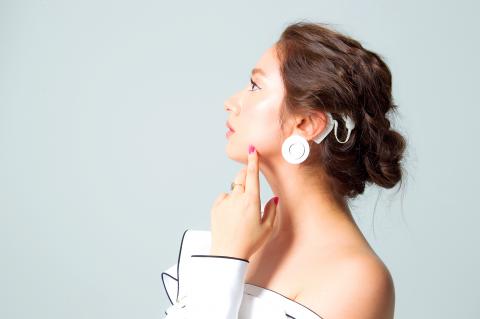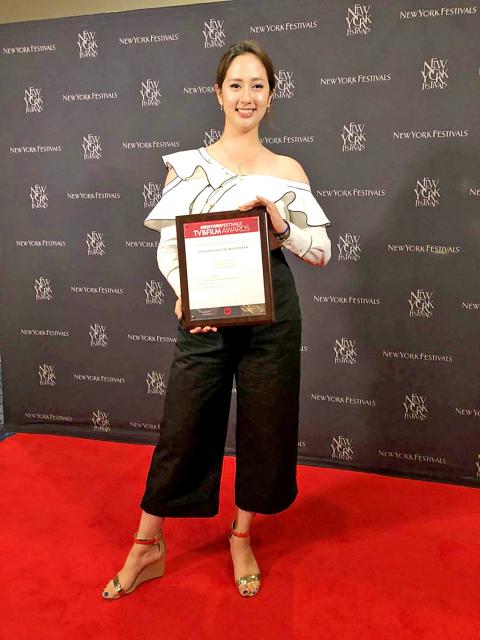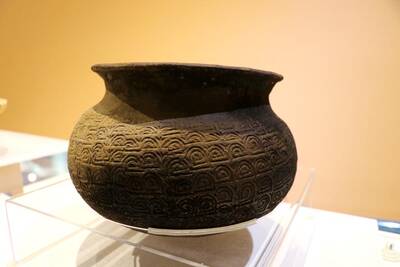Pineapple does not belong on pizza — at least according to Alana Nichols, who proceeds to ask the rest of the room to weigh in.
When the interviewer asks her if it’s something she asks people often, she replies with a hint of mischief, “No, you just asked me if there was anything else I wanted to say.”
Even though Nichols is wearing 15cm heels doing a formal interview in a television studio, she seems just as energetic and in her element as when she built a makeshift shelter and camped under the stars among spiders and snakes. Nichols, who was born deaf in both ears, is in a celebratory mood as her travel show, Follow Alana, recently won a Silver Remi at WorldFest Houston. She also picked up a finalist certificate at the New York Festivals Awards — TV & Film Awards.

Photo courtesy of Follow Alana
Not bad for a program that’s only been around for more than a year.
“It’s a reminder to celebrate as well as a powerful motivator to get better and do more,” she says.
COMMUNICATION STRUGGLES

Photo courtesy of Follow Alana
Nichols wants her cochlear implant, visibly located behind her ear with a wire that extends to the side of her head, to be visible during the shoot. She did not have deaf role models growing up, so she had no choice but to become one.
“It was important for me to be a representation of a successful person who is — some people don’t like the word but I don’t mind it — disabled,” she says.
And so she launched her show, even though her only prior on-camera experience was in a school play.

Photo courtesy of Follow Alana
“I had three lines and I messed it up,” she says.
Communication remains the biggest challenge, and in addition to her deafness she doesn’t speak Chinese despite growing up in Taiwan. Since her condition made it difficult to discern the tones in Chinese, her family raised her speaking English only.
“Every single conversation I have is a challenge,” she says. “For example, right now I’m concentrating very hard and making sure I can understand you as well as I speak. It’s something I work at every day, like a muscle you train at the gym.”
She also credits her family for being open about her condition.
“They knew it was going to be a lifelong struggle, so instead of trying to hide it or sweep it under the rug, they taught me how to see it in a positive light so I don’t get discouraged,” she says. “It’s become an automatic reflex to want to overcome the obstacles.”
REDIRECTING ATTENTION
Follow Alana kicks off its fifth season on July 14, the first time Nichols will be bringing her audience outside of Taiwan, this time to Australia. Nichols says she is a longtime vegetarian and her show also embodies her passions of animal welfare and environmentalism. But she avoids preaching.
“I learned that when you are the canary for something for too long, you lose your effect,” she says. “[When] I see issues related to pollution, I try to point them out... issues related to deafness, I try to point them out. But I try not to emphasize that my audience has to follow one issue, because everyone can help in different ways with different skill sets.”
Nichols is also learning from the show, and as she meets different people with different goals and passions, she firmly believes that there’s always a way to make an impact somehow.
“There’s so much that needs to be done, so many areas in this world that need help, so many innovations waiting to be discovered,” she says. “I’ve observed that some people may feel hopeless or feel their work doesn’t matter.”
Nichols says she is enthralled by Alishan at night when fireflies come out and the clear sky reveals an ocean of stars. As a big swimmer, she enjoys visiting the outlying islands. But when the time comes for her to take a vacation, she stays home.
“I don’t have to pack my luggage, I don’t have to sleep in my hotel room, that’s a vacation for me,” she laughs. “Even though I go to these amazing places and meet people, it’s important to recognize that you’re still working and it’s not vacation.”
As far as the future of the show, Nichols says that she doesn’t want to place any limitations on it. After all, she’s only venturing out of Taiwan after four complete seasons.
“It’s really easy to get distracted by social media and people’s opinions,” she says. “I hope that in my own small way I can redirect attention to things that matter.”
Like whether pineapple belongs on pizza.
The fifth season of Follow Alana begins on July 14 at 6pm on TVBS and 7pm on CtiTV.

Sept. 1 to Sept. 7 In 1899, Kozaburo Hirai became the first documented Japanese to wed a Taiwanese under colonial rule. The soldier was partly motivated by the government’s policy of assimilating the Taiwanese population through intermarriage. While his friends and family disapproved and even mocked him, the marriage endured. By 1930, when his story appeared in Tales of Virtuous Deeds in Taiwan, Hirai had settled in his wife’s rural Changhua hometown, farming the land and integrating into local society. Similarly, Aiko Fujii, who married into the prominent Wufeng Lin Family (霧峰林家) in 1927, quickly learned Hoklo (commonly known as Taiwanese) and

The low voter turnout for the referendum on Aug. 23 shows that many Taiwanese are apathetic about nuclear energy, but there are long-term energy stakes involved that the public needs to grasp Taiwan faces an energy trilemma: soaring AI-driven demand, pressure to cut carbon and reliance on fragile fuel imports. But the nuclear referendum on Aug. 23 showed how little this registered with voters, many of whom neither see the long game nor grasp the stakes. Volunteer referendum worker Vivian Chen (陳薇安) put it bluntly: “I’ve seen many people asking what they’re voting for when they arrive to vote. They cast their vote without even doing any research.” Imagine Taiwanese voters invited to a poker table. The bet looked simple — yes or no — yet most never showed. More than two-thirds of those

In the run-up to the referendum on re-opening Pingtung County’s Ma-anshan Nuclear Power Plant last month, the media inundated us with explainers. A favorite factoid of the international media, endlessly recycled, was that Taiwan has no energy reserves for a blockade, thus necessitating re-opening the nuclear plants. As presented by the Chinese-language CommonWealth Magazine, it runs: “According to the US Department of Commerce International Trade Administration, 97.73 percent of Taiwan’s energy is imported, and estimates are that Taiwan has only 11 days of reserves available in the event of a blockade.” This factoid is not an outright lie — that

The People’s Republic of China (PRC) yesterday paraded its military hardware in an effort to impress its own population, intimidate its enemies and rewrite history. As always, this was paced by a blizzard of articles and commentaries in the media, a reminder that Beijing’s lies must be accompanied by a bodyguard of lies. A typical example is this piece by Zheng Wang (汪錚) of Seton Hall in the Diplomat. “In Taiwan, 2025 also marks 80 years since the island’s return to China at the end of the war — a historical milestone largely omitted in official commemorations.” The reason for its